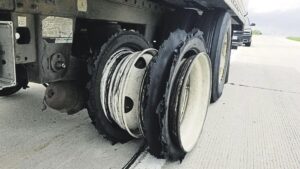When it comes to semi-truck tire repair in Flint Michigan, extreme weather conditions, including scorching heat, can have a significant impact. The hot weather poses unique challenges for these tires, potentially affecting their performance and longevity. In this article, we will explore the effects of hot weather on semi-truck tires and discuss measures that can be taken to mitigate these effects, specifically focusing on the context of Flint, Michigan.
 Increased Tire Pressure:
Increased Tire Pressure:
One of the most immediate effects of hot weather on semi-truck tires is an increase in tire pressure. As the temperature rises, the air inside the tires expands, leading to higher pressure levels. This can be particularly problematic as overinflated tires can result in reduced traction, decreased fuel efficiency, and uneven wear patterns. To counteract this, it is crucial for truck drivers and fleet managers to regularly check and adjust tire pressure during hot weather conditions. If replacement is needed, drivers and managers can consult experts such as a heavy duty truck drivetrain parts distributor.
Accelerated Wear and Aging:
Extended exposure to high temperatures can accelerate the wear and aging process of semi-truck tires. The intense heat can cause the rubber compounds to degrade more rapidly, leading to reduced tread life and increased susceptibility to blowouts. Additionally, excessive heat can cause the tire carcass to weaken, increasing the risk of sidewall damage or separation. It is essential for truck operators to monitor the tread depth regularly and replace tires that show signs of excessive wear or aging.
Reduced Traction:
Hot weather can adversely affect the traction capabilities of semi-truck tires. As the road surface heats up, it becomes more prone to becoming slick and oily, especially when combined with precipitation. This can result in reduced grip and longer stopping distances, posing a safety hazard on the road. It is crucial for drivers to adjust their driving behavior to account for reduced traction and maintain a safe following distance.
Increased Risk of Tire Blowouts:
High temperatures can contribute to an increased risk of tire blowouts, especially if the tires are already worn or underinflated. Heat buildup from extended driving combined with the external heat can cause the tire to weaken and potentially result in a blowout. Regular inspection of tire condition, maintaining proper tire pressure, and avoiding overloading the vehicle are essential steps in minimizing the risk of tire blowouts during hot weather.
Importance of Maintenance and Precautionary Measures:
To mitigate the adverse effects of hot weather on semi-truck tires, regular maintenance and precautionary measures are crucial. This includes maintaining proper tire pressure, conducting frequent inspections for signs of wear or damage, rotating tires regularly, and keeping the tires clean to prevent debris buildup. Additionally, drivers should exercise caution when driving on hot roads and avoid sudden maneuvers that can put unnecessary stress on the tires.
Hot weather can significantly impact the performance and longevity of semi-truck tires. Increased tire pressure, accelerated wear, reduced traction, and the heightened risk of blowouts are some of the key challenges faced during scorching weather conditions. By implementing proper maintenance practices and taking precautionary measures, truck drivers and fleet managers can minimize these effects, ensuring safer and more efficient journeys on the road. Regular inspections, adequate tire pressure management, and proactive monitoring of tire condition are essential steps in safeguarding the reliability and performance of semi-truck tires in hot weather.


